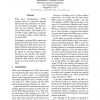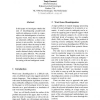281 search results - page 7 / 57 » Similarity-based Word Sense Disambiguation |
ACL
2010
13 years 9 months ago
2010
Word sense disambiguation (WSD) systems based on supervised learning achieved the best performance in SensEval and SemEval workshops. However, there are few publicly available ope...
ACL
2001
14 years 7 days ago
2001
In this paper we investigate whether the task of disambiguating pseudowords (artificial ambiguous words) is comparable to the disambiguation of real ambiguous words. Since the two...
CORR
2004
Springer
13 years 10 months ago
2004
Springer
This paper describes the National Research Council (NRC) Word Sense Disambiguation (WSD) system, as applied to the English Lexical Sample (ELS) task in Senseval-3. The NRC system ...
CICLING
2009
Springer
14 years 11 months ago
2009
Springer
We propose a supervised word sense disambiguation (WSD) system that uses features obtained from clustering results of word instances. Our approach is novel in that we employ semi-s...
COLING
2008
14 years 9 days ago
2008
We propose a supervised word sense disambiguation (WSD) method using tree-structured conditional random fields (TCRFs). By applying TCRFs to a sentence described as a dependency t...


